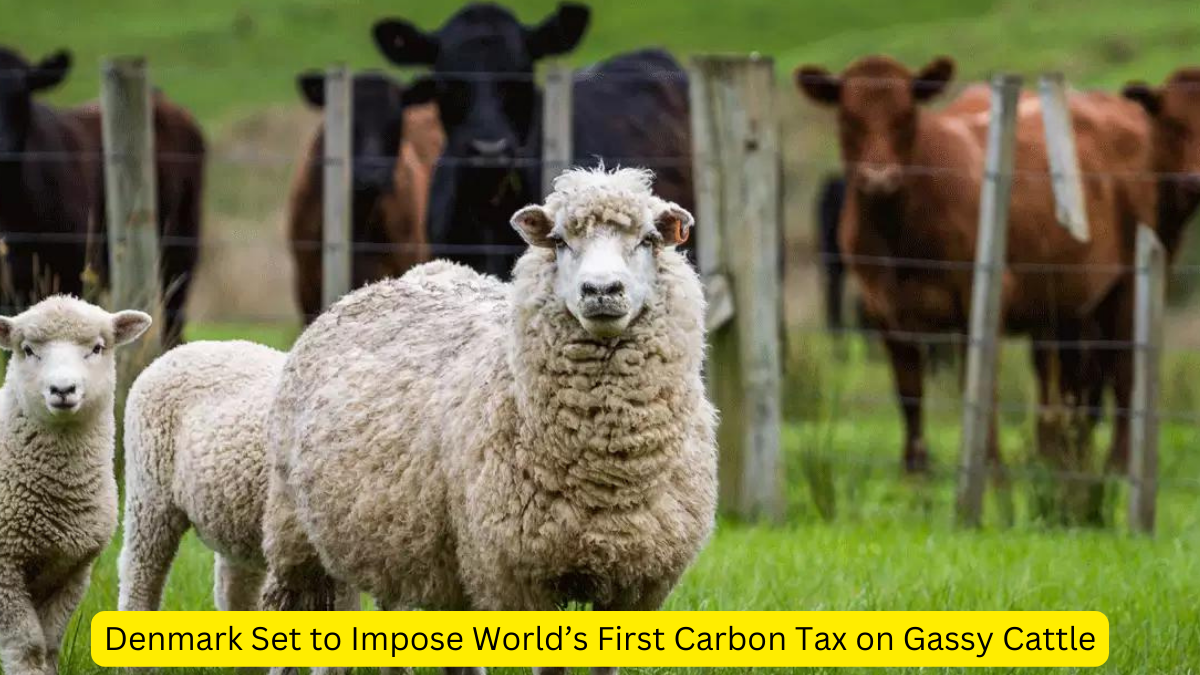Denmark plans to implement a tax on livestock farmers starting in 2030, making it the first nation to do so. This initiative targets methane emissions from cows, sheep, and pigs, which are significant contributors to global warming. The goal is to achieve a 70 per cent reduction in Danish greenhouse gas emissions from 1990 levels by the year 2030.
First country to impose a carbon tax
Denmark is set to become the first country to impose a carbon tax on livestock emissions, targeting methane, a potent greenhouse gas. This pioneering initiative aims to reduce greenhouse gas emissions significantly and inspire other nations to follow suit. Jacob Jensen, Denmark’s farming minister, highlighted the groundbreaking nature of the agreement, stating, “We are writing a new chapter in Danish agricultural history.” The plan includes substantial subsidies for the agricultural sector’s green transition, meant to reinforce the country’s commitment to sustainable farming practices.
How will the tax work?
Denmark’s livestock carbon tax is part of a broader strategy to cut greenhouse gas emissions by 70 per cent from 1990 levels by 2030. Danish Taxation Minister Jeppe Bruus announced that from 2030, livestock farmers will be taxed 300 kroner ($43) per ton of carbon dioxide equivalent, rising to 750 kroner ($108) by 2035. However, with an income tax deduction of 60 per cent, the actual cost per ton will start at 120 kroner ($17.3) and increase to 300 kroner by 2035.
Apply to cows, sheep and pigs
This tax will apply to cows, sheep, and pigs, with cows being the primary focus due to their significant methane emissions. Methane, primarily emitted by livestock through digestion and manure, is about 87 times more potent than carbon dioxide over a 20-year period. Livestock farming accounts for about 32 per cent of human-caused methane emissions, according to the UN Environment Program. The Danish government’s goal is to make the country climate neutral by 2045.
What kind of environmental impact is Denmark looking at?
Denmark plans to invest 40 billion kroner ($3.7 billion) in various environmental measures, including reforestation and the creation of wetlands. The government will also allocate €5.3 billion to reforest 250,000 hectares of agricultural land by 2045 and set aside 140,000 hectares of lowland by 2030. These efforts aim to absorb CO2 and mitigate nitrogen pollution, a significant environmental issue in Denmark’s coastal waters. The carbon tax is projected to cut 1.8 million tons of CO2-equivalent emissions by 2030, helping Denmark meet its ambitious climate goals. The tax will initially charge farmers 120 kroner per ton of CO2-equivalent emissions from 2030, increasing to 300 kroner by 2035. On average, Danish dairy cows emit 5.6 tons of CO2-equivalent per year, resulting in an annual tax of 672 kroner ($96) per cow, which will rise to 1,680 kroner ($241) by 2035.
How has the industry reacted?
The tax has sparked mixed reactions among farmers and industry leaders. Maria Reumert Gjerding, head of the Danish Society for Nature Conservation, described the agreement as “a historic compromise.” She stated, “We have succeeded in landing a compromise on a CO2 tax, which lays the groundwork for a restructured food industry -also on the other side of 2030.” Conversely, some farmers see the measures as burdensome. He expressed concern that it would hinder agricultural investments in green technologies.
Denmark aims
Denmark’s approach, however, has achieved a broad-based consensus among various stakeholders, including farmers, industry representatives, and environmental groups. Denmark’s carbon tax on livestock represents a significant step towards combating climate change. By targeting methane emissions from agriculture, Denmark aims to reduce its environmental footprint while setting a precedent for other countries.
Important takeaways for all competitive exams:
- Capital of Denmark: Copenhagen
- Denmark official language: Danish
- Government in Denmark: Monarchy, Unitary state, Parliamentary system, 6 more
- Continent: Europe
- Population of Denmark: 59 lakhs (2022)




 India and Israel Begin First Round of FT...
India and Israel Begin First Round of FT...
 India Holds Spot as No. 2 Buyer of Russi...
India Holds Spot as No. 2 Buyer of Russi...
 PM Modi’s Historic Israel Visit: First I...
PM Modi’s Historic Israel Visit: First I...








